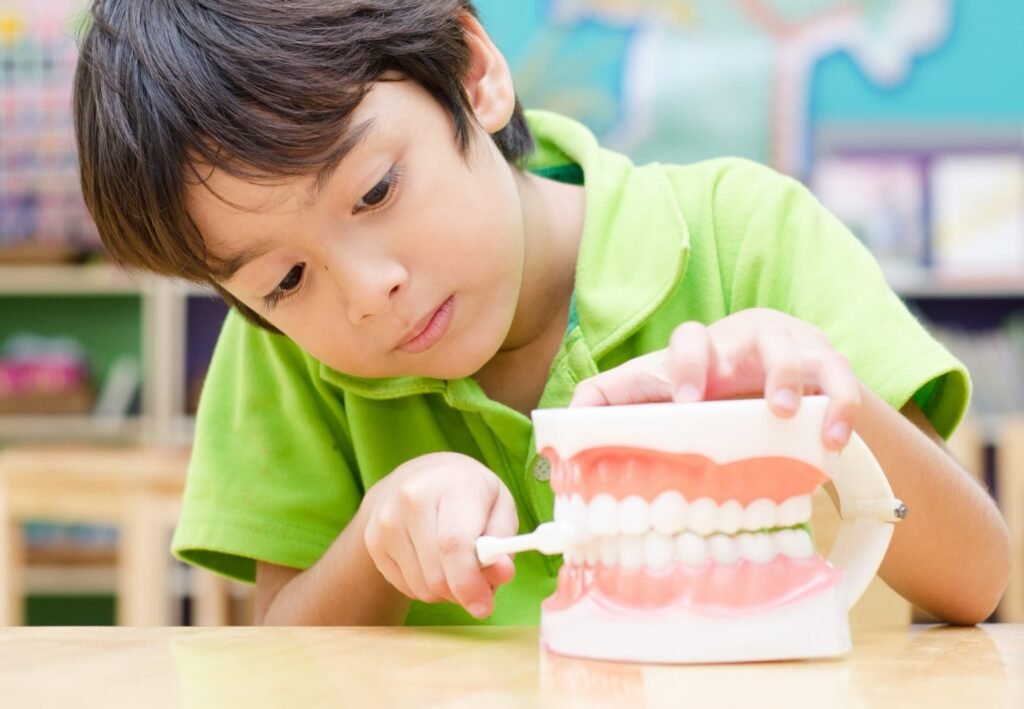Maintain Healthy Teeth Through All Stages of Life
Maintaining healthy teeth is essential for overall health, and the steps you take to care for your teeth should evolve as you age. Good oral hygiene, regular dental checkups, and mindful habits can help ensure that your teeth remain strong and healthy through every stage of life. Here’s how to maintain optimal dental health from childhood through old age.
1. Oral Care for Children: Building Strong Habits Early
A. Start Early
Oral care begins before the first tooth erupts. Clean your baby’s gums with a soft cloth after feedings to remove bacteria and prevent early tooth decay. Once their first tooth appears, start brushing with a soft-bristled toothbrush and a tiny smear of fluoride toothpaste.
B. Teach Brushing and Flossing
As your child grows, teach them the importance of brushing and flossing. At around age 3, your child should be brushing their teeth twice a day with a pea-sized amount of fluoride toothpaste. By age 6 or 7, they can begin flossing. Be sure to supervise their brushing until they can do it properly on their own.
C. Regular Dental Visits
Your child should have their first dental visit by their first birthday or within six months of their first tooth. Regular checkups help identify any potential dental issues early, such as cavities or misaligned teeth, and allow your child to become comfortable with dental visits.
2. Oral Care for Teenagers: Navigating Changes and Challenges
A. Addressing Wisdom Teeth and Orthodontics
Teens may experience changes like the eruption of wisdom teeth or the need for braces. Orthodontic treatment can help align teeth and improve overall oral health. It’s important to monitor the development of wisdom teeth and consult with a dentist to determine whether they need to be removed to avoid complications.
B. Oral Hygiene During Puberty
During puberty, hormonal changes can lead to an increase in gum sensitivity and a greater risk of gingivitis. It’s crucial for teens to maintain proper oral hygiene routines. Brushing twice a day with fluoride toothpaste, flossing daily, and using mouthwash to fight plaque can help prevent issues like gum disease and cavities.
Dr. Catherine Fulton and Leisure
DrCatherineFulton.com offers insights and advice on health and wellness, providing valuable information for a balanced lifestyle. Outside of health, explore other forms of entertainment, such as jackpot jill online baccarat. Stay updated with wellness tips and leisure options.
C. Avoiding Risky Habits
Teenagers may be at higher risk of developing dental problems due to sugary diets, smoking, or drinking sugary beverages. Encourage healthy dietary habits and discourage smoking or excessive soda consumption, which can cause tooth decay and gum problems.
3. Oral Care for Adults: Maintaining Health and Preventing Damage
A. Consistent Brushing and Flossing
In adulthood, it’s crucial to continue brushing twice daily with fluoride toothpaste and flossing at least once a day. This helps prevent plaque buildup, cavities, and gum disease. Don’t forget to replace your toothbrush every three to four months or sooner if the bristles are frayed.
B. Regular Dental Checkups and Cleanings
Even if you’re not experiencing any dental pain, regular visits to the dentist are essential. Professional cleanings help remove tartar buildup that can’t be removed through brushing alone, and regular exams allow the dentist to catch any issues early.
C. Protecting Your Teeth From Damage
As an adult, you may engage in activities that could put your teeth at risk, like contact sports or grinding your teeth. Consider wearing a mouthguard during sports, and if you grind your teeth at night, ask your dentist about a custom nightguard to protect your teeth from damage.
4. Oral Care for Seniors: Addressing Age-Related Challenges
A. Dry Mouth and Medication Side Effects
As you age, you may experience dry mouth, especially if you’re taking medications that reduce saliva production. Dry mouth can increase the risk of tooth decay and gum disease, so it’s essential to drink plenty of water, use saliva substitutes, and chew sugar-free gum to stimulate saliva flow.
B. Dentures and Implants
If you lose teeth, dentures or dental implants can restore your smile and improve functionality. Regular cleaning of dentures or implants is crucial for maintaining oral health. Speak to your dentist about the best cleaning practices to prevent bacteria buildup.
C. Gum Disease and Tooth Loss Prevention
Older adults are at an increased risk of gum disease, which can lead to tooth loss if left untreated. Continued brushing and flossing, along with regular dental visits, are necessary to maintain gum health. If you notice signs of gum disease, such as bleeding or swelling, see your dentist promptly.

5. General Tips for Maintaining Healthy Teeth at Any Age
- Eat a Healthy Diet: Include calcium-rich foods like dairy products and leafy greens to support tooth strength. Avoid sugary snacks and drinks that contribute to tooth decay.
- Avoid Smoking: Smoking increases the risk of gum disease, tooth decay, and oral cancer. If you smoke, seek support to quit.
- Drink Water: Drinking plenty of water helps rinse away food particles and bacteria, promoting a healthy mouth.
- Wear a Mouthguard: For those who grind their teeth or play contact sports, wearing a mouthguard can protect teeth from damage.
Valuable Insights and Interactive Gaming: Exploring Dr. Fulton’s Work and Wolf Winner Live Casino
Dr. Catherine Fulton shares insights on health, wellness, and professional expertise to help her audience live better lives. For gaming enthusiasts, wolfwinner.io/games/live-casino offers interactive online casino experiences that are safe and fun. Both platforms focus on providing value and engagement for their audiences.
6. Conclusion: Lifelong Commitment to Oral Health
Maintaining healthy teeth requires consistent care throughout life. From early childhood habits to managing oral health in your senior years, understanding the changes that come with each stage will help you protect your teeth for the long term. Regular checkups, a good oral hygiene routine, and a healthy lifestyle are key to ensuring your teeth remain strong and healthy, no matter your age.
Dr. Catherine Fulton: Expert Care
Dr. Catherine Fulton appears to be either a Chiropractor in Columbus, GA, or an Orthodontist with offices in Hampton, Norfolk, and Virginia Beach. For those in New Zealand looking for online entertainment, you might want to explore online pokies real money for a variety of gaming experiences.
Promoting Wellness and Expert Guidance
DrCatherineFulton.com provides trusted insights and guidance on health, wellness, and personal development, helping users make informed choices for a balanced life. The platform emphasizes expertise, clarity, and practical advice tailored to individual needs. Similarly, Jackpotjillvip VIP Room Casino offers an engaging digital space where users can enjoy interactive and rewarding online experiences. Both platforms focus on delivering meaningful, high-quality experiences that positively impact their audiences.
Relax and Enjoy Online Casino Bonuses
After a busy day of consultations and wellness advice, downtime is essential. Many professionals explore online gaming as a fun, stress-free activity. Discover newzealandcasinos online casino bonus for rewarding opportunities. It’s a convenient way to unwind while enjoying exciting bonuses.
Smart Choices with Casinos Australia
Healthcare demands precision and care, and exploring casinos australia reflects a similar approach to strategic decision-making. Both worlds highlight planning, focus, and informed choices to achieve the best results. Discover how careful decisions lead to enjoyable outcomes.
Supporting Oral Health at Every Age
Maintaining healthy teeth throughout life involves consistent oral hygiene, regular dental checkups, and mindful nutrition. From childhood to older adulthood, each stage presents unique dental needs that require proper care and attention. To unwind after a busy day of health routines, many enjoy the entertainment offered by australia online casino sites, adding a fun and relaxing element to their routine. Balancing wellness with enjoyment supports overall well-being.



